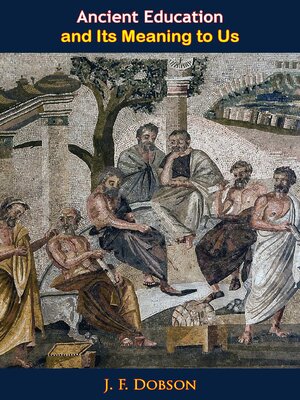
Sign up to save your library
With an OverDrive account, you can save your favorite libraries for at-a-glance information about availability. Find out more about OverDrive accounts.
Find this title in Libby, the library reading app by OverDrive.



Search for a digital library with this title
Title found at these libraries:
| Library Name | Distance |
|---|---|
| Loading... |
WHAT is the true object of education? Should the educator aim at training the largest possible number of individuals to be of the greatest possible service to the State, up to the limit of the capability of each, or should he rather try to give each one an opportunity to develop fully the best qualities which he possesses, regardless of whether this method of training may or may not seem to be of immediate practical use either to the person or to the community? The question, in most ages and most countries, does not admit of a simple answer. It came nearest to being answered in Sparta, which of all nations known to history paid least attention to the individual as such, and in Republican Rome, which, though not so rigid as Sparta, regarded education as concerned mainly with the production of useful citizens. In Rome, at least before the great development which followed on the introduction of Greek ideas, and in Sparta throughout her history, this social side of education was predominant. In other Greek states there was at all times more of individualism. The Ionians of Asia Minor represent the extreme of the opposite attitude, and even democratic Athens did not wish to have all her citizens turned out of the same mould, but, while giving equal opportunities to all, neither expected nor wished that everyone should follow the same line or reach the same goal... Plato, for instance, who was deeply influenced by Spartan ideals, attached the highest importance to the State, and though, in his Republic, he would have the individuals highly trained in many branches of learning which in Sparta or early Rome would have been rejected as either superfluous or harmful, it has been often pointed out that the individuals in his State pass a laborious life of service and self-sacrifice in order to assure the greatest happiness to the greatest number; while his strictures on poetry and other imitative arts shew further that the individual is to him of little importance.







